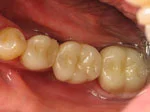

Even though complete or partial dentures are not the ideal treatment to replace missing teeth (Dental implant supported restorations are), they can provide many people with a very acceptable restoration that will last and function for many years.
Complete dentures are used when all the teeth have been lost in either your upper or lower arch. They allow you to smile, speak and masticate (a big word that means “chew”) your food so you maintain proper nutrition. While not the ideal restoration these days, they are necessary and will allow you to function far better than if you didn’t replace your missing teeth and had to mash up all your food.
One version of a complete denture is called an IMMEDIATE DENTURE. An immediate denture is a complete denture that is placed at the same time as your last remaining tooth is removed. It allows you to instantly have a full set of teeth and walk out of the office wearing your new denture.
Another version of a complete denture is called an OVERDENTURE. An overdenture is a complete denture that is partially supported by some remaining roots or implants. These roots or implants usually have some type of attachment that allows an insert placed in the denture to snap the overdenture in place. Overdentures are a very effective form of complete denture therapy and far more desirable than a normal complete denture.
A PARTIAL DENTURE is a tooth replacement appliance that replaces one or more missing teeth. It is held on by ‘clipping’ on to some of your existing natural teeth or crowns. They are two types of partial dentures- conventional and precision.
A CONVENTIONAL PARTIAL DENTURE is a tooth replacement appliance that stays in place by ‘hooking’ or ‘clipping’ on to some of your existing natural teeth or crowns. You can generally identify a conventional partial denture by a small metal clasp around one or more teeth.
A PRECISION PARTIAL DENTURE is a tooth replacement appliance that stays in place by attaching to one or more permanent crowns. Generally, precision partial dentures show no metal when you smile and attach to crowns using a number of different precision devices that are very long lasting.



